– Mohammed Talha Siddi Bapa
At Navanagar in Bagalkote, a quiet Sunday (Sep. 21, 2025) gathering became a symbolic moment for Karnataka. On the dais sat Swamis, a Buddhist Monk, a Parish Priest, a Brahma Kumari representative, and civic leaders. Presiding over the symposium, Mohammed Kunhi, State Secretary of Jamaat-e-Islami Hind (JIH) Karnataka, described Prophet Muhammad ﷺ as “the Creator’s greatest gift to humanity.” With clarity and logical reasoning, he explained how the Prophet’s teachings continue to serve as a compass for justice, equality, and compassion.
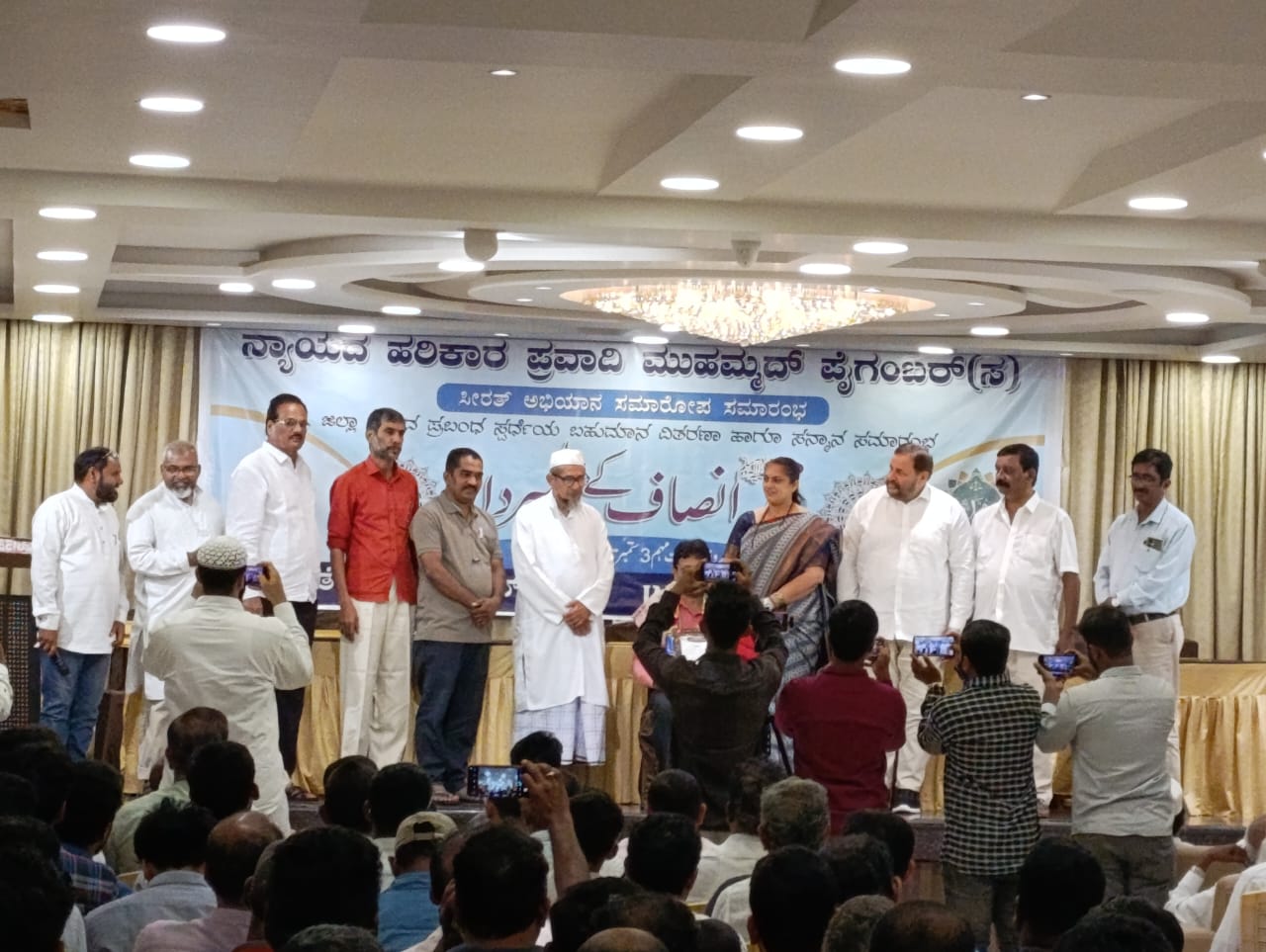 The presence of leaders from different faiths – Veerasangameshwara Shivacharya Swamiji, Basavalinga Swamiji of Shirur, Dampal Bhantaji of the Buddhist Vihara, K. Nagaratna of the Brahma Kumaris, and a priest from St. Mary’s Church – added credence to the occasion. The programme also honoured young essay winners, underscoring that the message of justice must reach the next generation.
The presence of leaders from different faiths – Veerasangameshwara Shivacharya Swamiji, Basavalinga Swamiji of Shirur, Dampal Bhantaji of the Buddhist Vihara, K. Nagaratna of the Brahma Kumaris, and a priest from St. Mary’s Church – added credence to the occasion. The programme also honoured young essay winners, underscoring that the message of justice must reach the next generation.
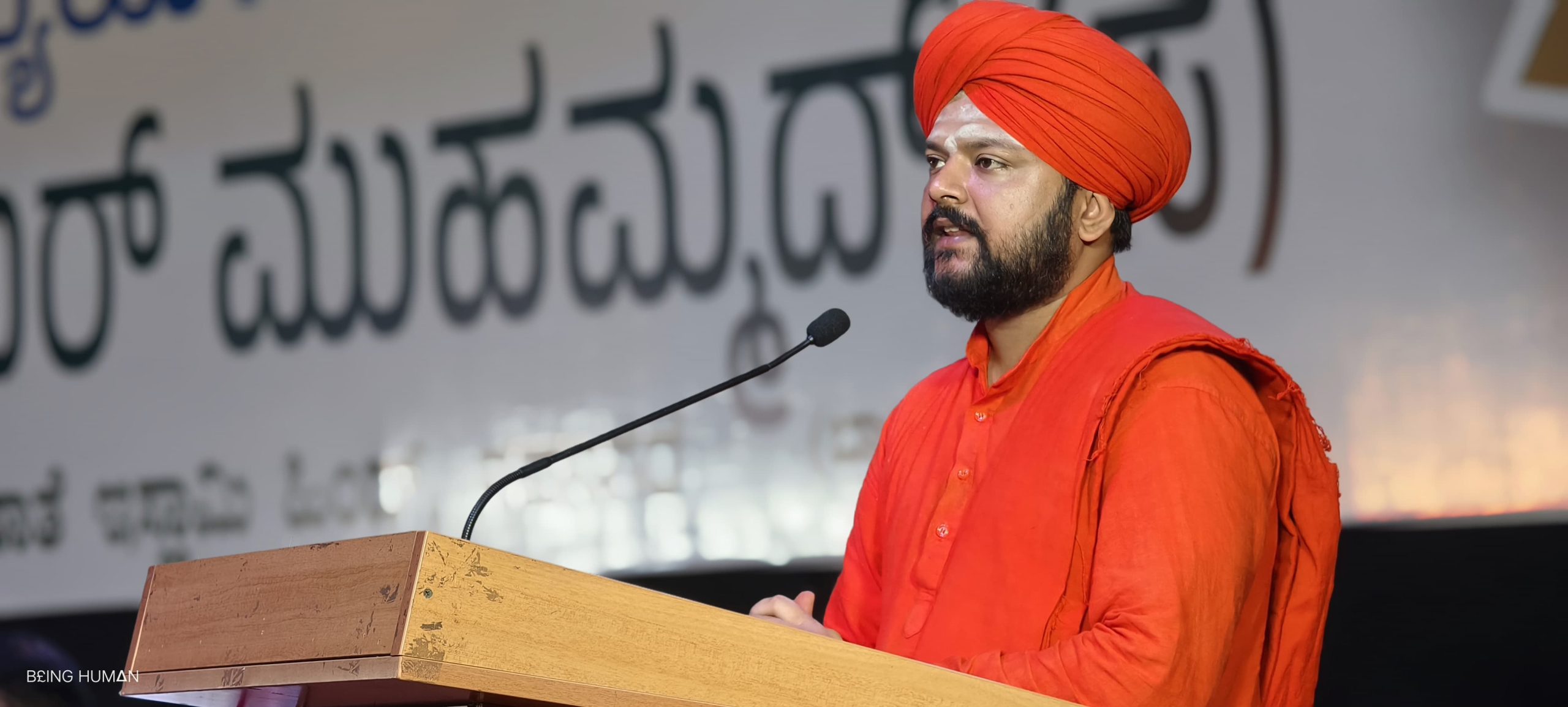 One participant from the Jain community captured the mood in words later shared widely:
One participant from the Jain community captured the mood in words later shared widely:
“On this blessed occasion, being invited and honoured by your Jamaat was a matter of pride. The respect, love, and warmth with which your community received me, and the discipline of such a large audience sitting in silence – these will remain unforgettable. It was proof that your society values not only faith but also respect.”
That spirit of inclusivity and dignity became the hallmark of the Seerat Provachans across Karnataka this September.
A Journey Through Karnataka
From Navanagar to Bhatkal, from Hubballi to Udupi, from Harihar to Ilkal and Sagar – wherever the stage was set, the mood was the same. Halls filled beyond expectation. Audiences listened in silence. WhatsApp messages of appreciation poured in afterwards. The Seerat Campaign 2025, organised during the month of Rabiul Awwal, thus became not just a series of religious programmes but a state-wide educational journey.
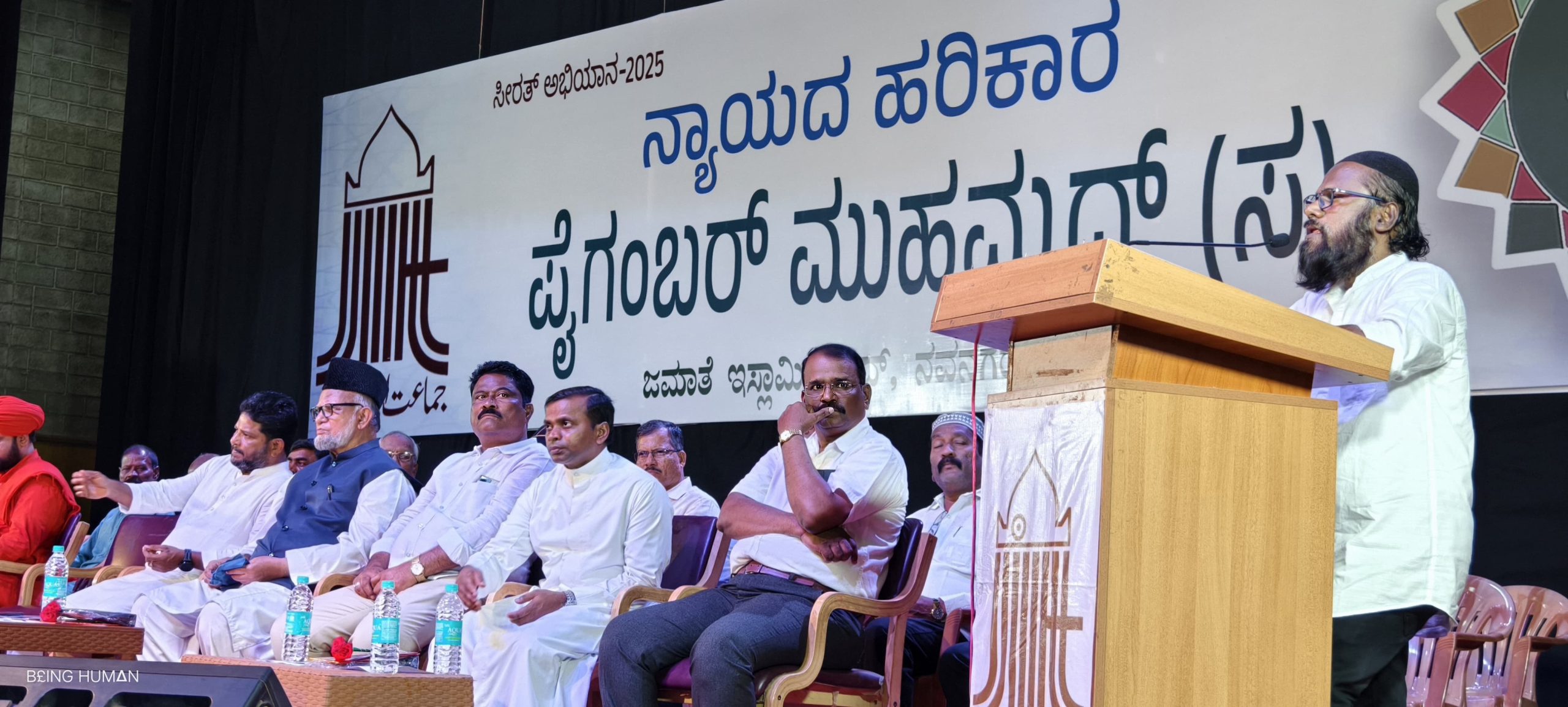 The theme was clear and consistent: “Prophet Muhammad ﷺ – Messenger of Justice.” What differed was the voice in which it was spoken – sometimes forceful and evidence-based, sometimes tender and affectionate, but always in Kannada, the language of the land.
The theme was clear and consistent: “Prophet Muhammad ﷺ – Messenger of Justice.” What differed was the voice in which it was spoken – sometimes forceful and evidence-based, sometimes tender and affectionate, but always in Kannada, the language of the land.
Different Voices, Shared Message
- Mohammed Kunhi (Hubballi, Udupi, Navanagar) spoke in a style marked by logic and evidence. He reminded audiences that justice is not optional but foundational – from personal morality to politics and law. His arguments appealed strongly to academics, officials, and civic leaders who found in his words a rational bridge between faith and democracy.
- Akbar Ali of Udupi (Harihar, Sagar) chose the path of warmth and affection. His speeches were less about debate and more about winning hearts, presenting justice and compassion as lived values that bring people together.
- Lal Hussain Kandgal (Ilkal, Gadag) spoke with poetic affection, weaving love and empathy into his reflections. His approach underscored that justice is not only a principle of law but also an expression of humanity.
- Saeedi Ismail (Bhatkal) carried the universalist message, highlighting that the Prophet ﷺ was not confined to Muslims but stood as a teacher for all of humankind.
Together, these voices demonstrated a powerful blend – reason convincing the mind, and affection touching the heart.
Hubballi and Udupi: Justice and Peacekeeping
In Hubballi, more than 1,500 people packed into a hall, far beyond what the organisers expected. The diversity of the audience – teachers, professionals, and grassroots workers – reflected the broad appeal of the message.
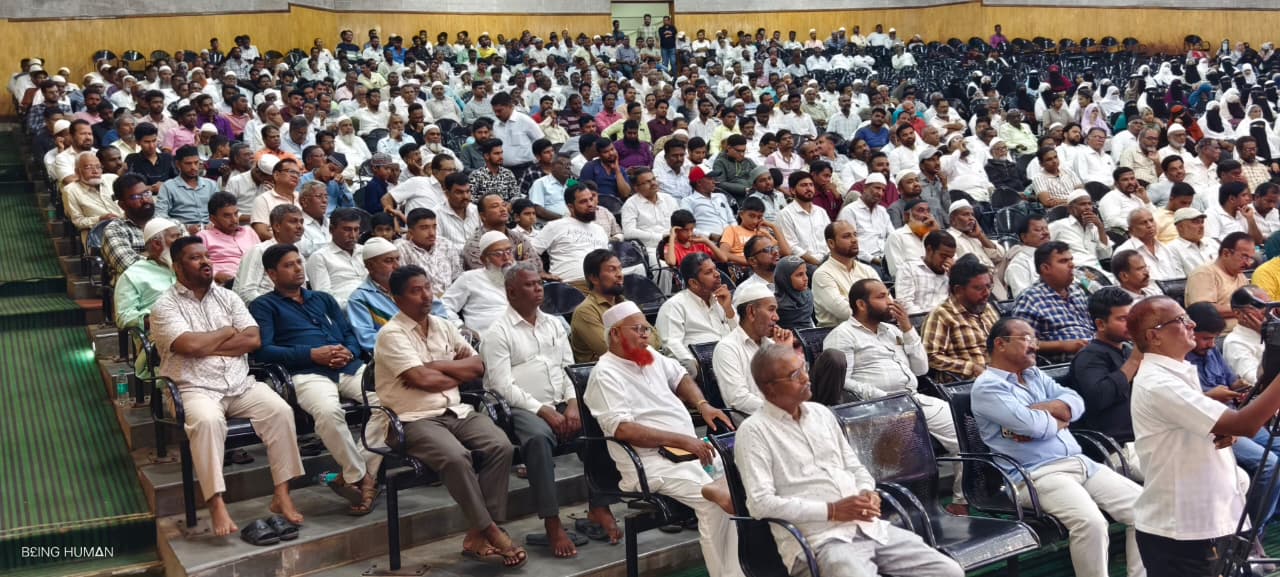 In Udupi, the gathering took a significant turn with the presence of Deputy Superintendent of Police, D.T. Mananadavar. Addressing the audience, he stressed that justice and communal harmony are indispensable to peacekeeping in a diverse society. “Both religion and law,” he observed, “aim at the same goal: fairness, compassion, and the safeguarding of human dignity.”
In Udupi, the gathering took a significant turn with the presence of Deputy Superintendent of Police, D.T. Mananadavar. Addressing the audience, he stressed that justice and communal harmony are indispensable to peacekeeping in a diverse society. “Both religion and law,” he observed, “aim at the same goal: fairness, compassion, and the safeguarding of human dignity.”
His words carried weight not only because of his uniform but because they echoed the theme of the campaign: justice is the bridge that holds societies together. His participation reminded the audience that peace is not maintained by force alone but by shared values of fairness and respect.
Bhatkal: Justice in Recognising Merit
The coastal town of Bhatkal hosted the valedictory programme, presided over by Saeedi Ismail. He emphasised that Prophet Muhammad ﷺ transformed society not through words alone but through action, dismantling corrupt practices and raising the downtrodden to dignity.
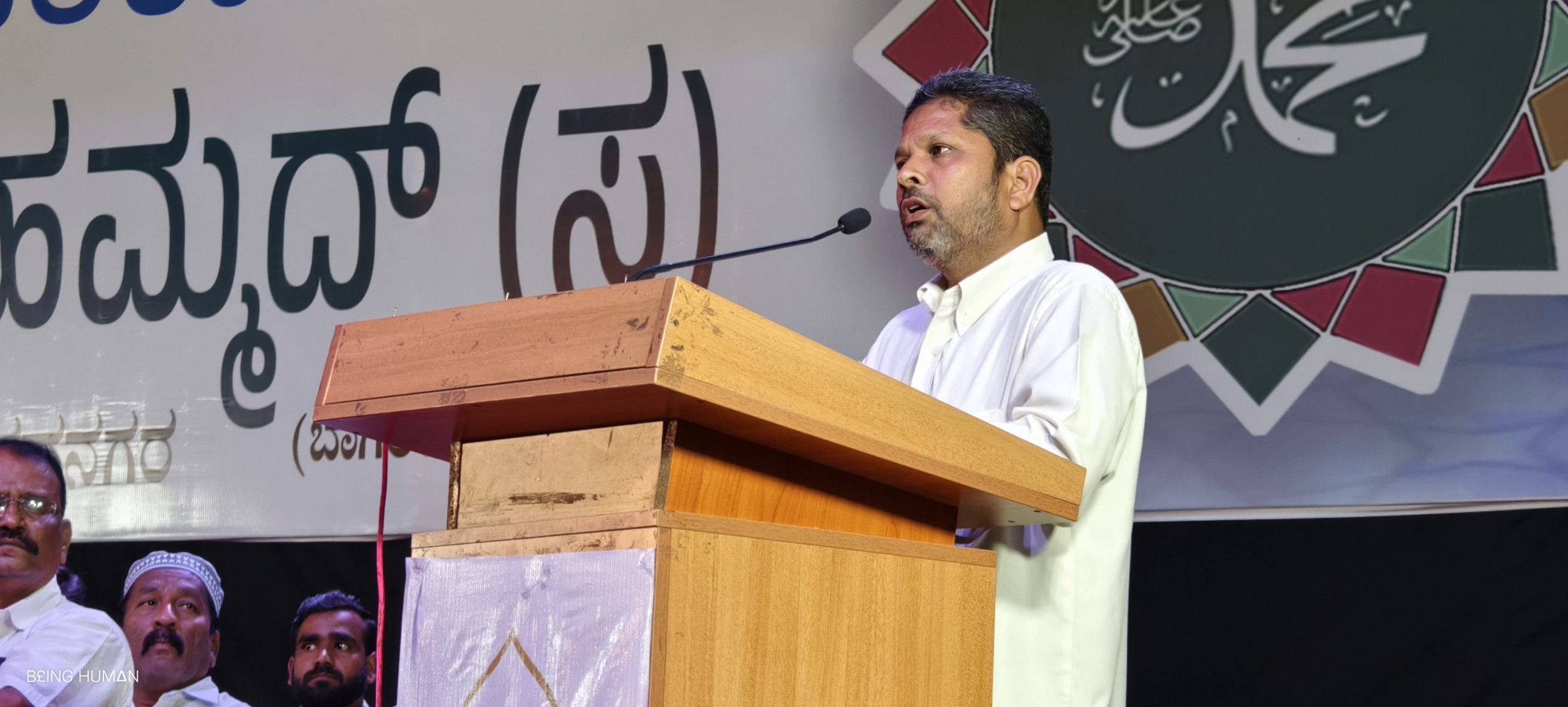 The event also highlighted justice in practice by felicitating Shri Shridhar Shet Shirali, recipient of Karnataka’s Best Teacher Award. In his acceptance, he noted that while he had been honoured at many forums, this occasion was “special” because it was shared by people of all faiths on one platform.
The event also highlighted justice in practice by felicitating Shri Shridhar Shet Shirali, recipient of Karnataka’s Best Teacher Award. In his acceptance, he noted that while he had been honoured at many forums, this occasion was “special” because it was shared by people of all faiths on one platform.
“At a time when WhatsApp universities build walls between communities, this gathering proved that we are one family. That is the true meaning of justice,” he said.
For the organisers, the felicitation was more than ceremony; it was a recognition that justice includes honouring those who contribute to society, regardless of religion or background.
Harihar, Sagar, Ilkal, and Gadag: The Language of Affection
In Harihar and Sagar, Akbar Ali of Udupi spoke in his signature style of warmth. He reminded audiences that justice begins with compassion, and compassion begins with seeing one another as human beings first. His affectionate appeals struck a chord, leaving many listeners visibly moved.
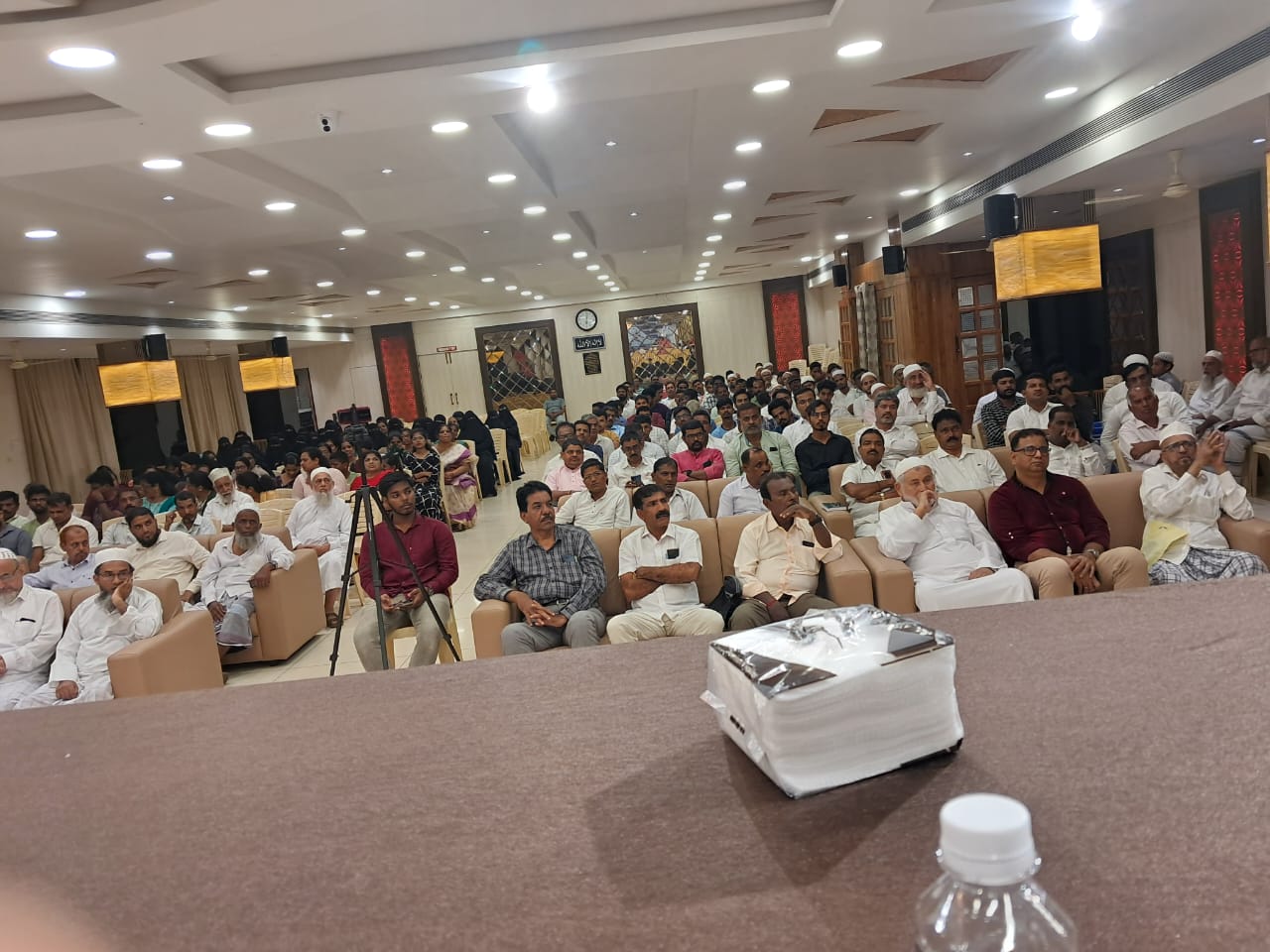 In Ilkal and Gadag, Lal Hussain Kandgal spoke the language of affection and poetry, making justice not only a legal or political concept but a deeply human one. His Kannada oratory, gentle and inclusive, resonated strongly with local audiences.
In Ilkal and Gadag, Lal Hussain Kandgal spoke the language of affection and poetry, making justice not only a legal or political concept but a deeply human one. His Kannada oratory, gentle and inclusive, resonated strongly with local audiences.
The Kannada Dimension
One of the most striking aspects of this campaign was its language. For centuries, Urdu has been the tongue of Islamic scholarship in India, and many Muslims in Karnataka continue to cherish it. Yet in a state where movements to protect and promote Kannada are woven into the cultural fabric, the decision to conduct Seerat Provachans in Kannada gave the campaign added weight.
It made the Prophet’s teachings accessible to a wider audience and signalled respect for the state’s linguistic pride. As one participant remarked after a programme, “Hearing about the Prophet’s life in Kannada felt like the message belonged to us directly, without translation.”
This was a conscious effort by JIH Karnataka – not to replace Urdu, but to broaden the circle of understanding, to show that Islam’s moral message is not bound to a single language but belongs to all of humanity.
Audience Reflections
Feedback from participants showed the emotional impact. In Navanagar, a Jain leader spoke of the honour he felt in being invited and seated on stage, calling it a sign of genuine respect. In Bhatkal, G.B. Naik, a civic leader, wrote:
“The Seerat programme was truly meaningful. Beyond the arrangements, what touched me was how you are working to unite hearts. Such efforts are needed if peace, harmony, and trust are to grow in our society.”
These voices highlighted the campaign’s success in creating not just events but experiences of mutual respect.
One Mood, One Message
Across Karnataka – from Navanagar’s plural stage to Hubballi’s overflowing crowd, from Udupi’s police officer stressing peace to Bhatkal’s felicitation of a teacher, from Harihar’s affectionate appeals to Ilkal’s poetic compassion – the Seerat Provachans carried the same mood: enthusiasm, discipline, and a hunger to hear the message of justice.
For JIH Karnataka, this was part of a broader struggle: to educate society about Islam not as a closed tradition but as a living source of justice and equality; to counter stereotypes with dialogue; and to present the Prophet’s ﷺ life in the idiom of Kannada, the language of the land.
For many participants, the campaign suggested that when justice is spoken with sincerity – whether in logic or affection, in Urdu or Kannada – people are more willing to listen.



